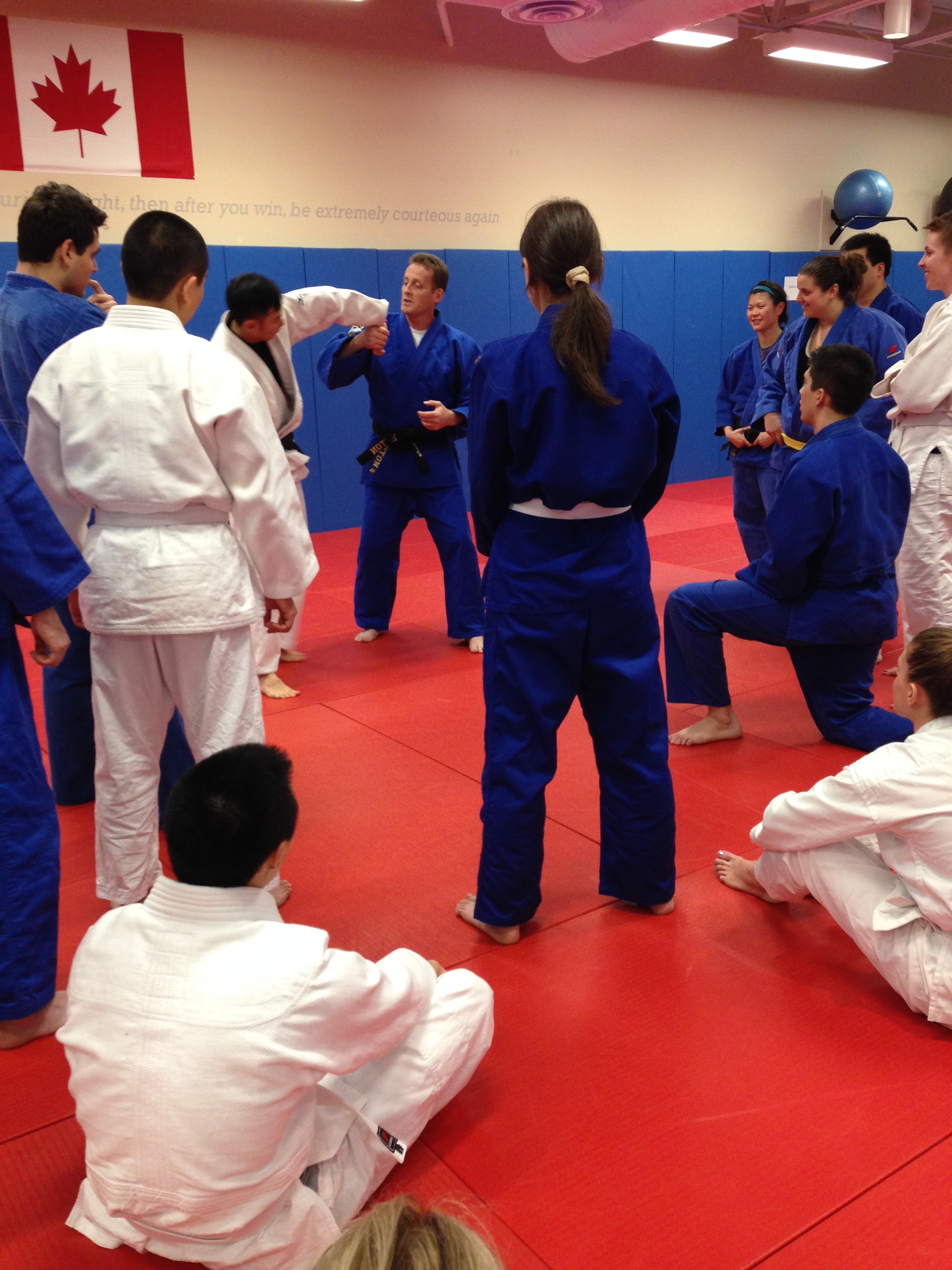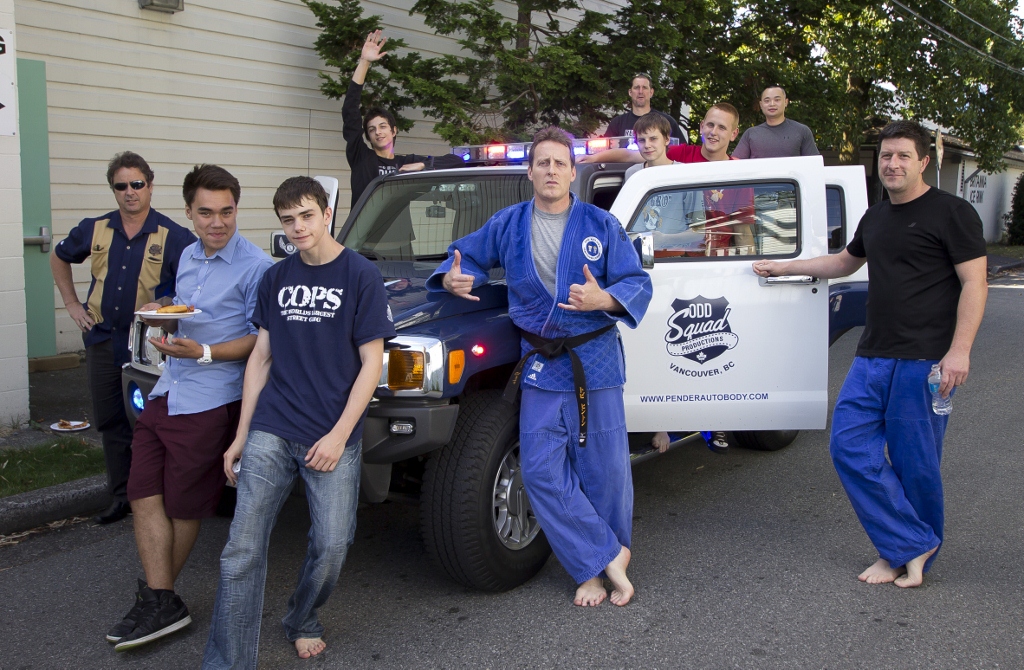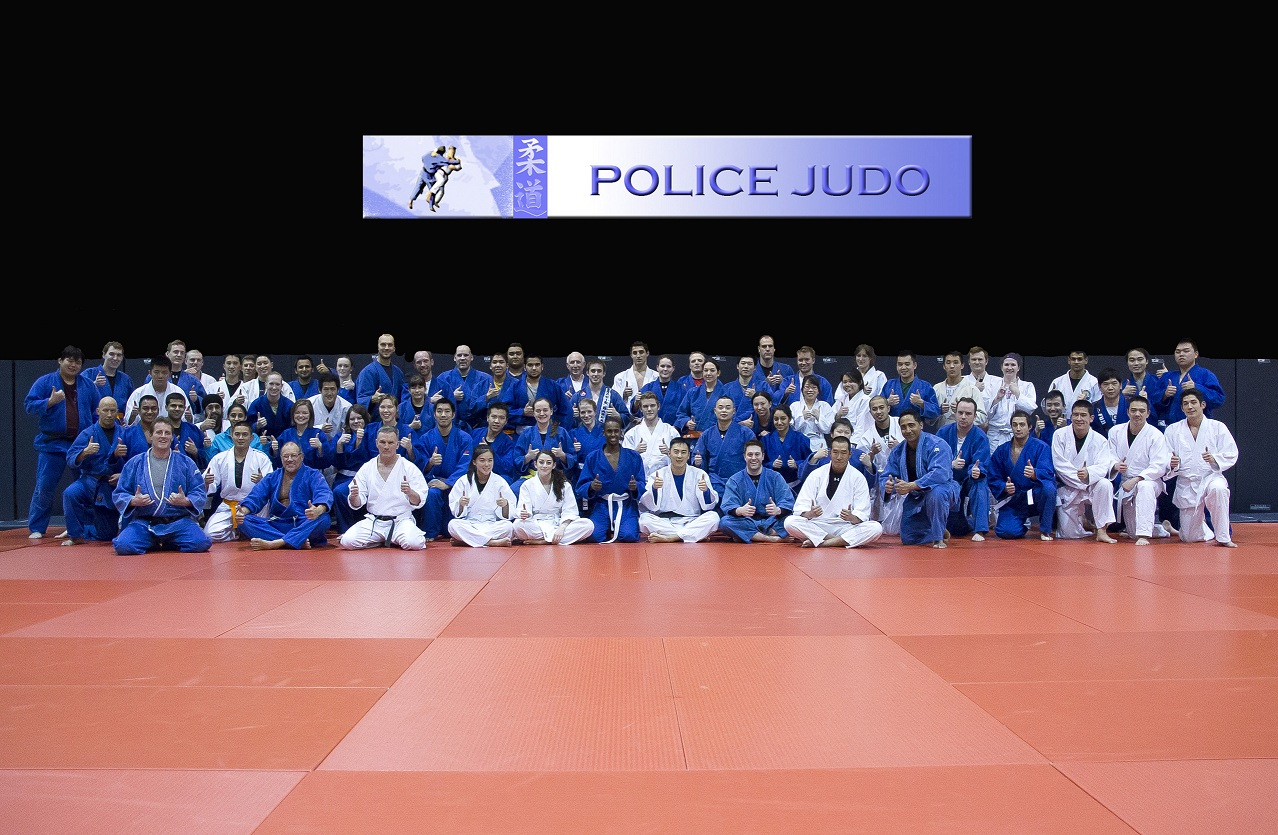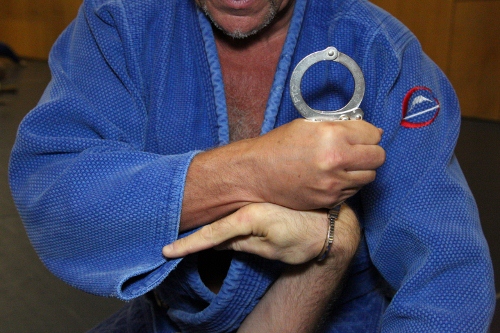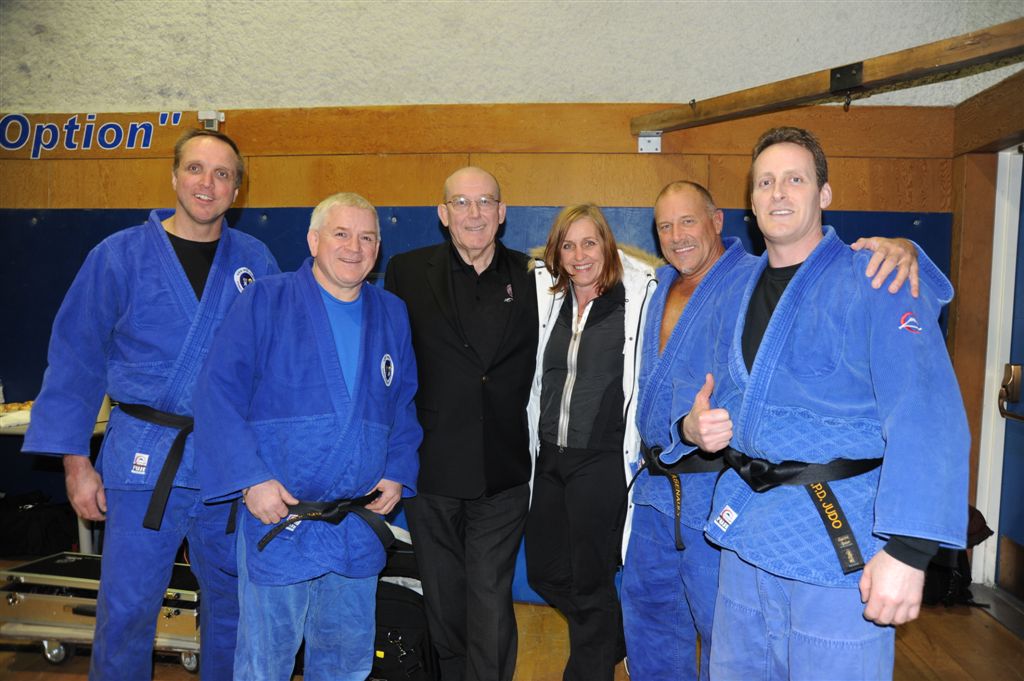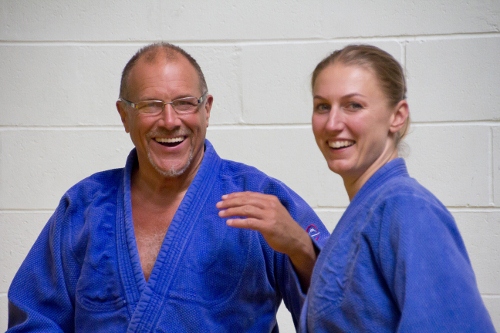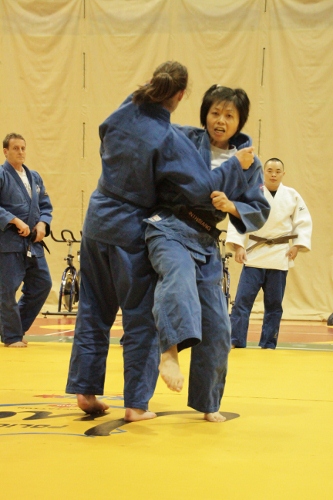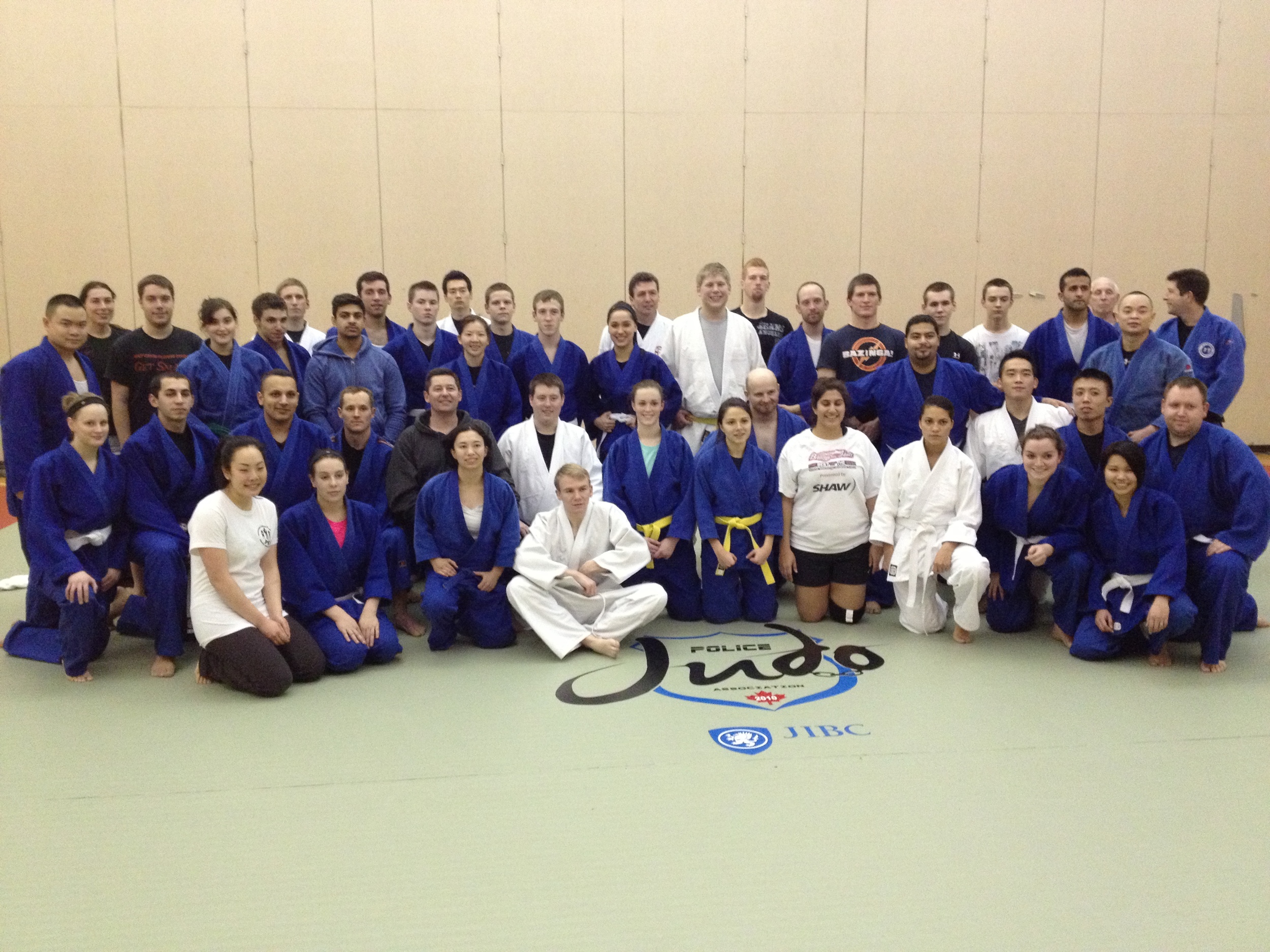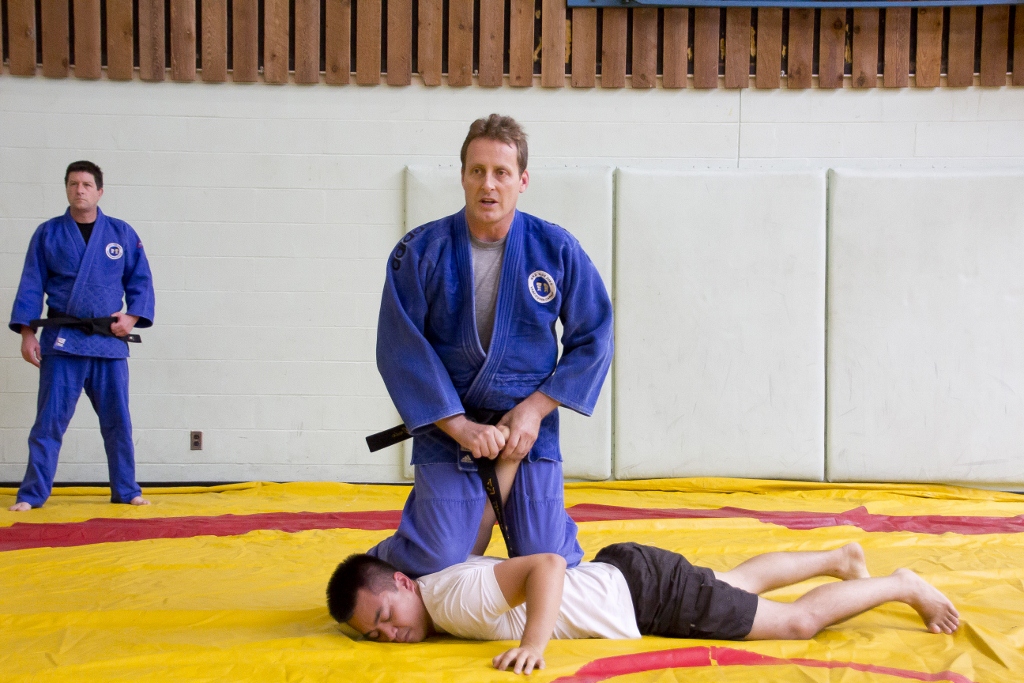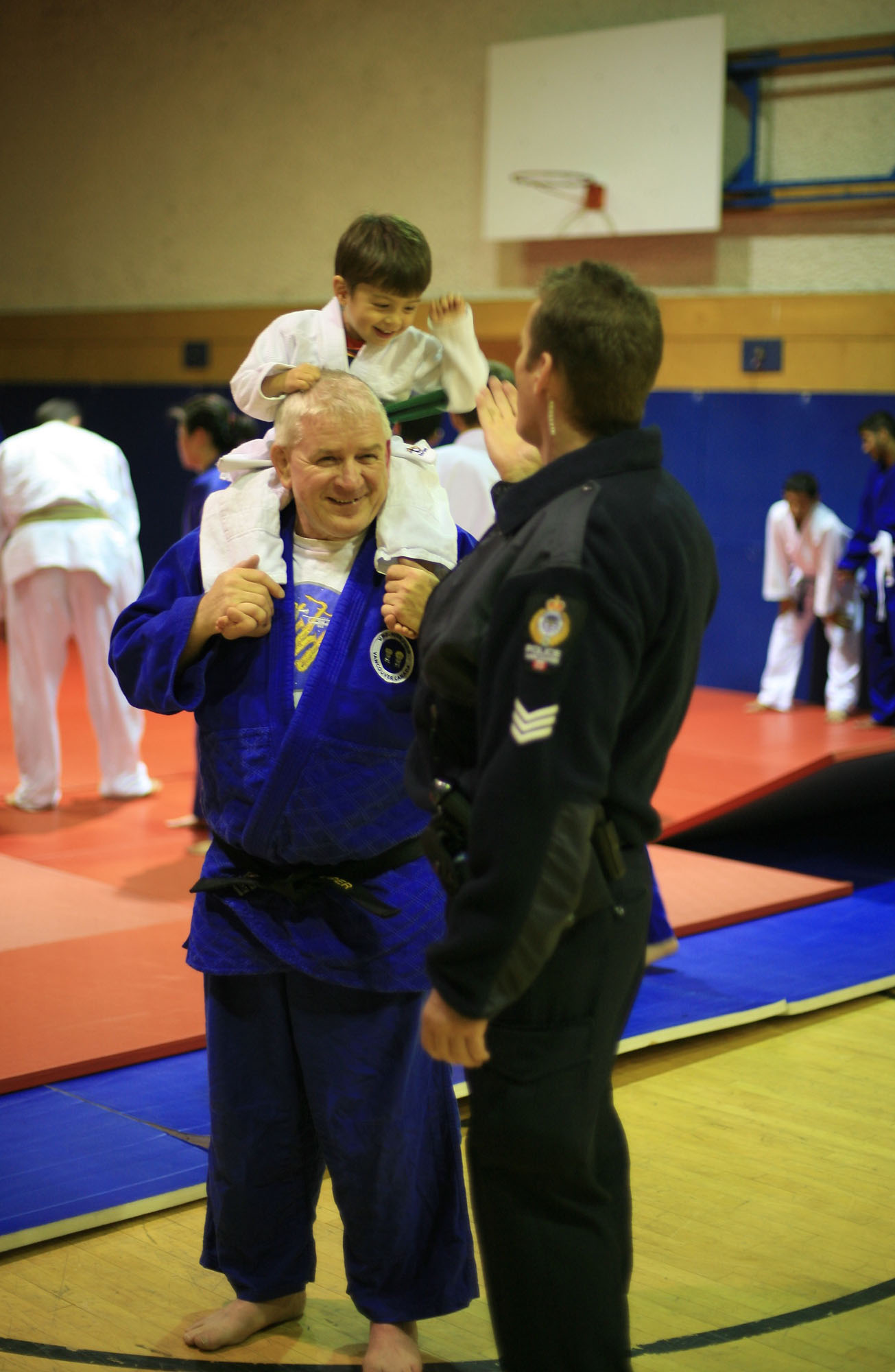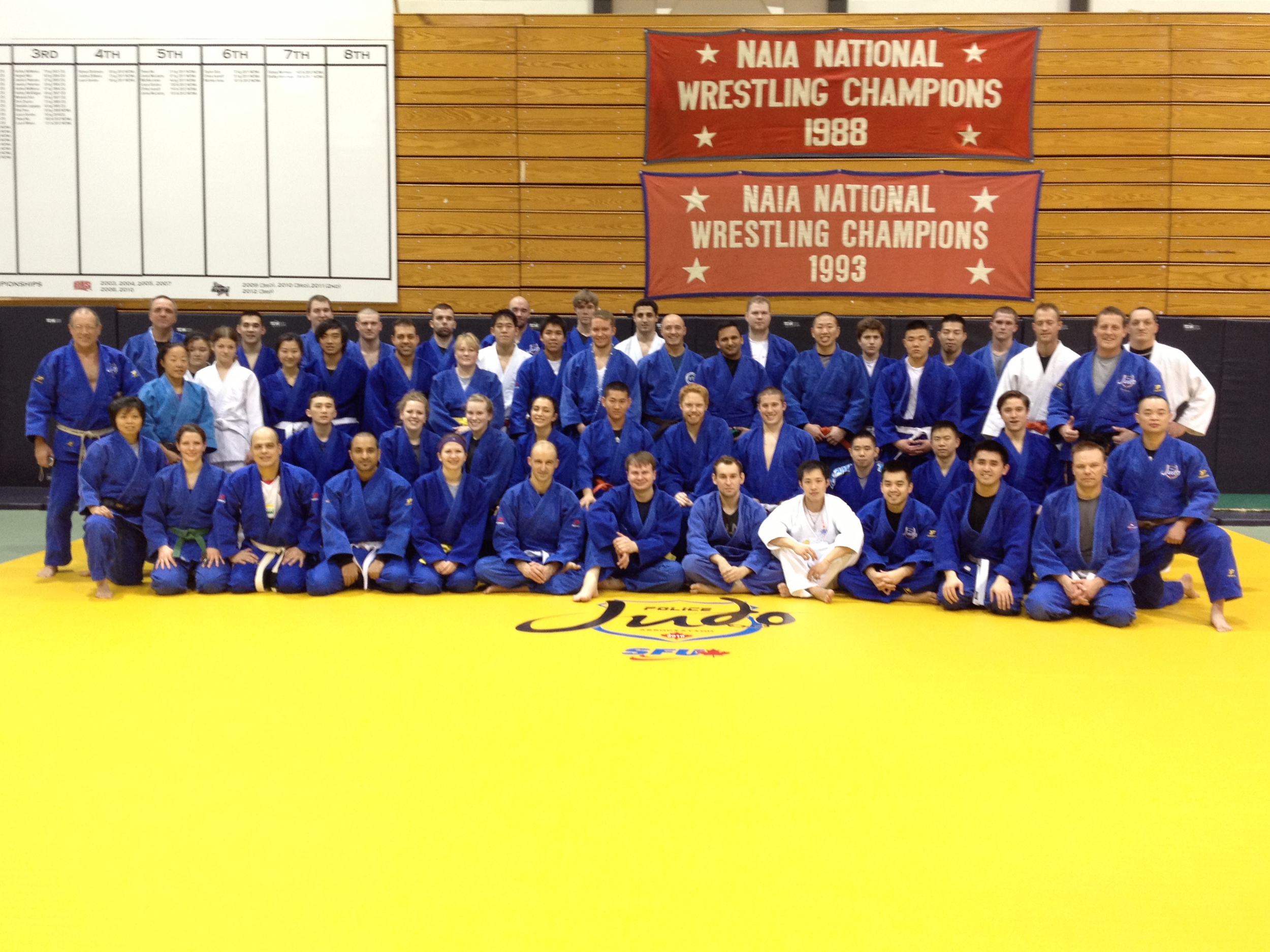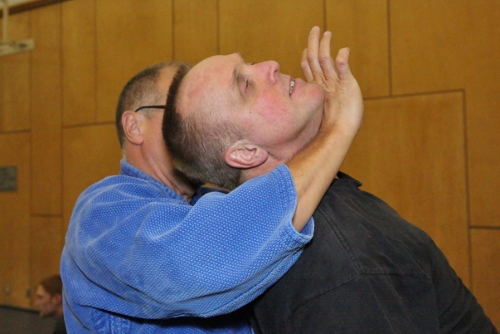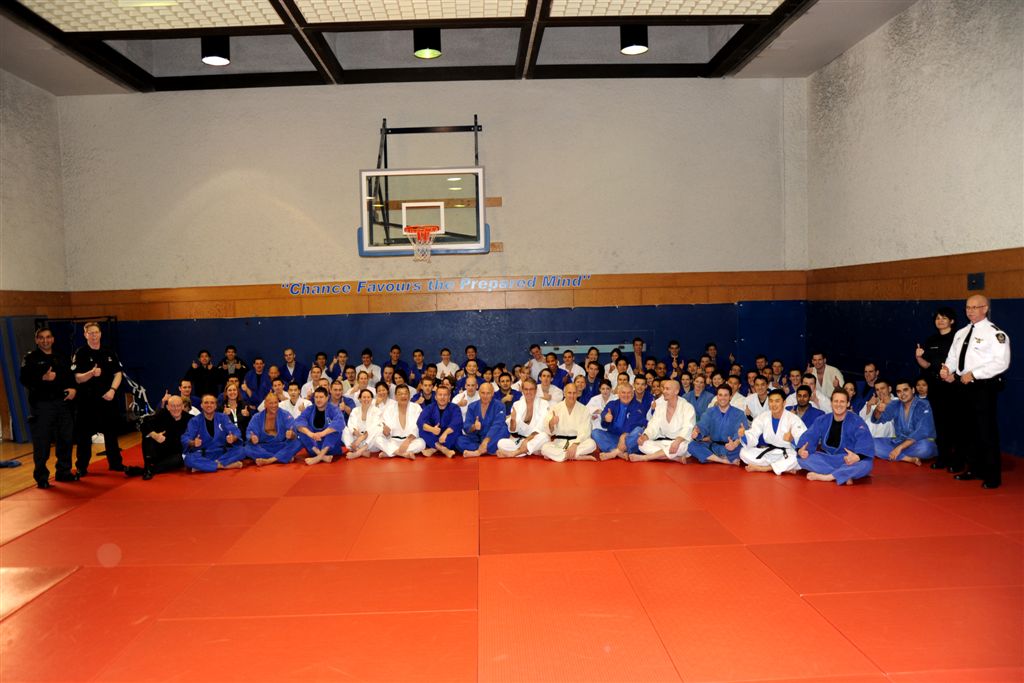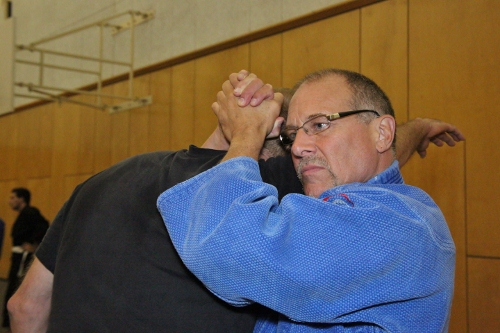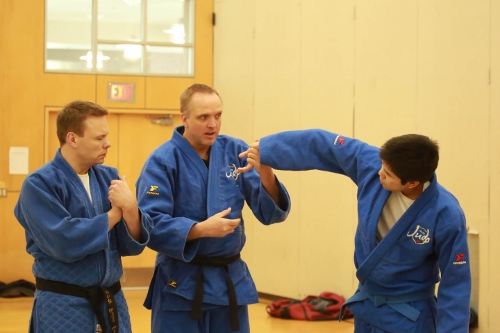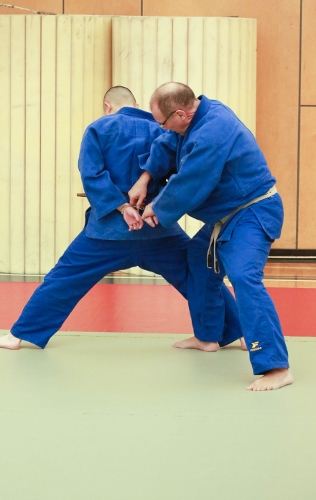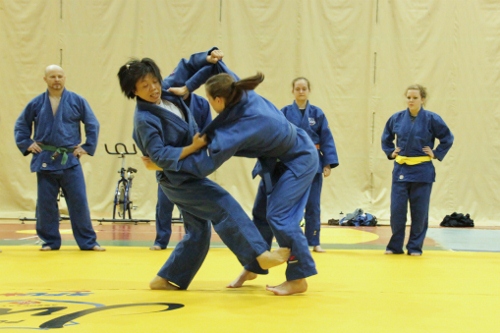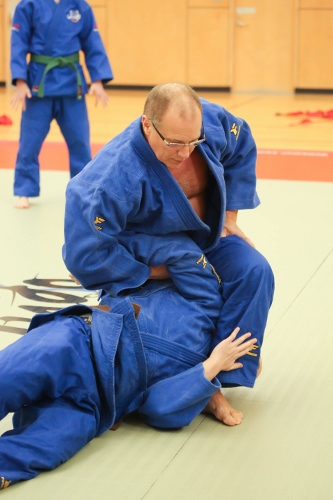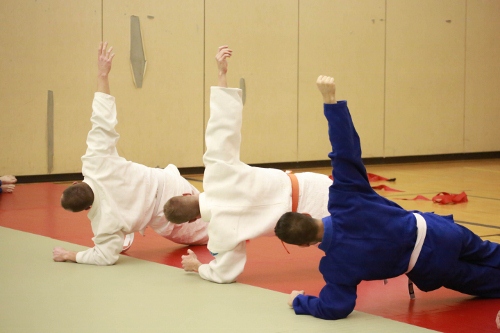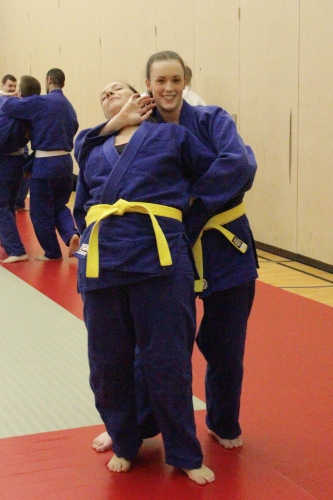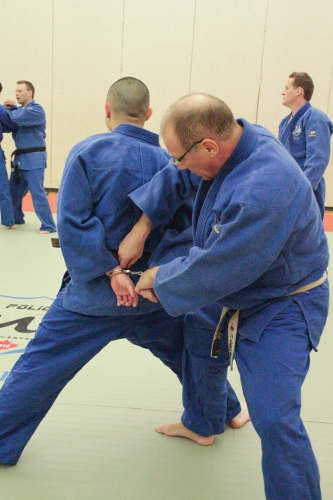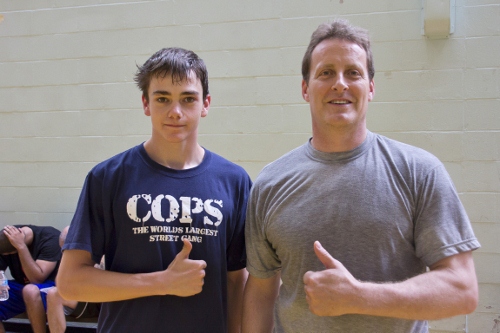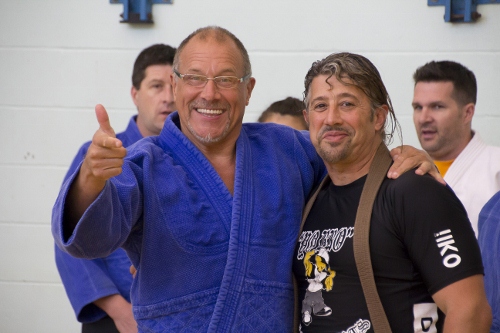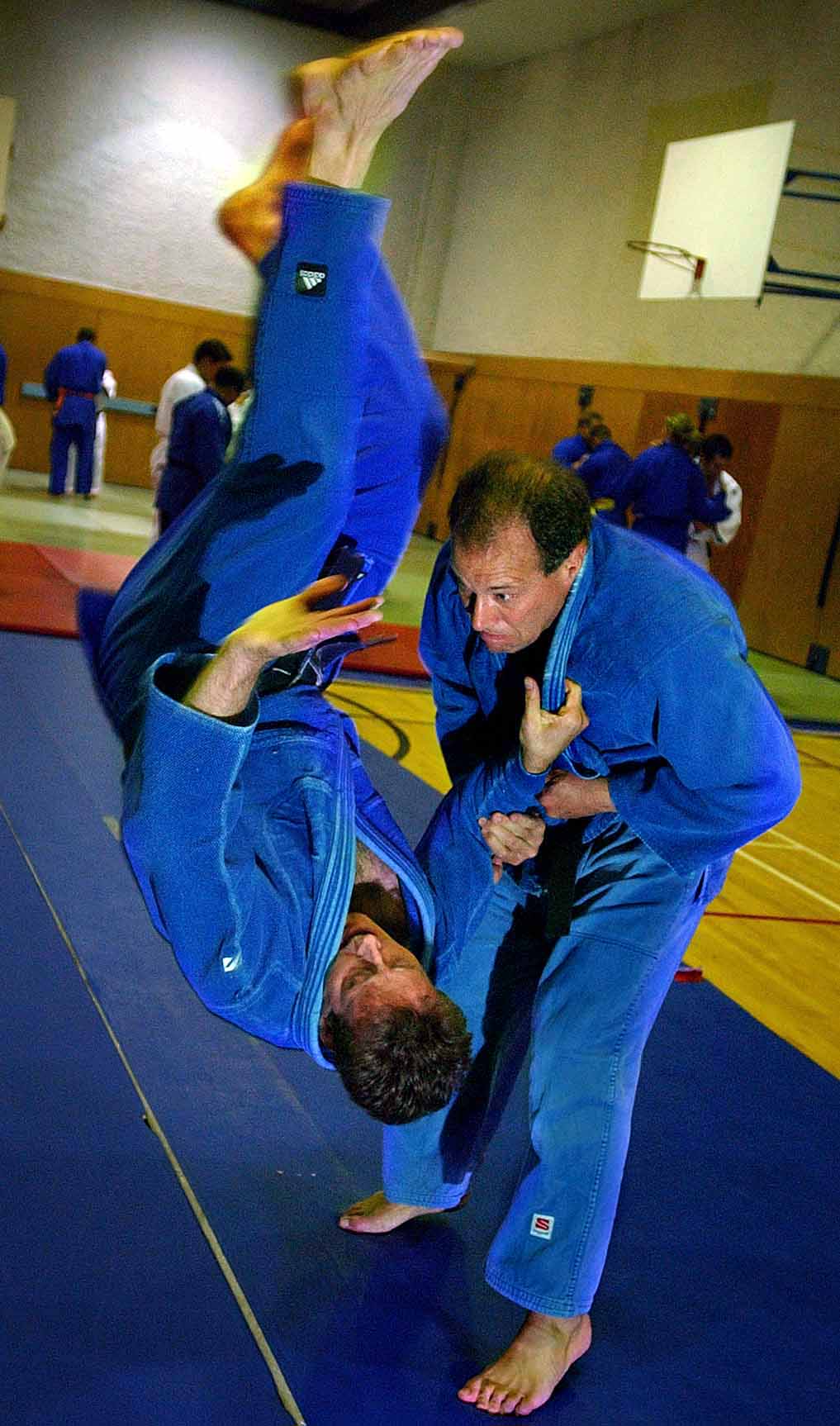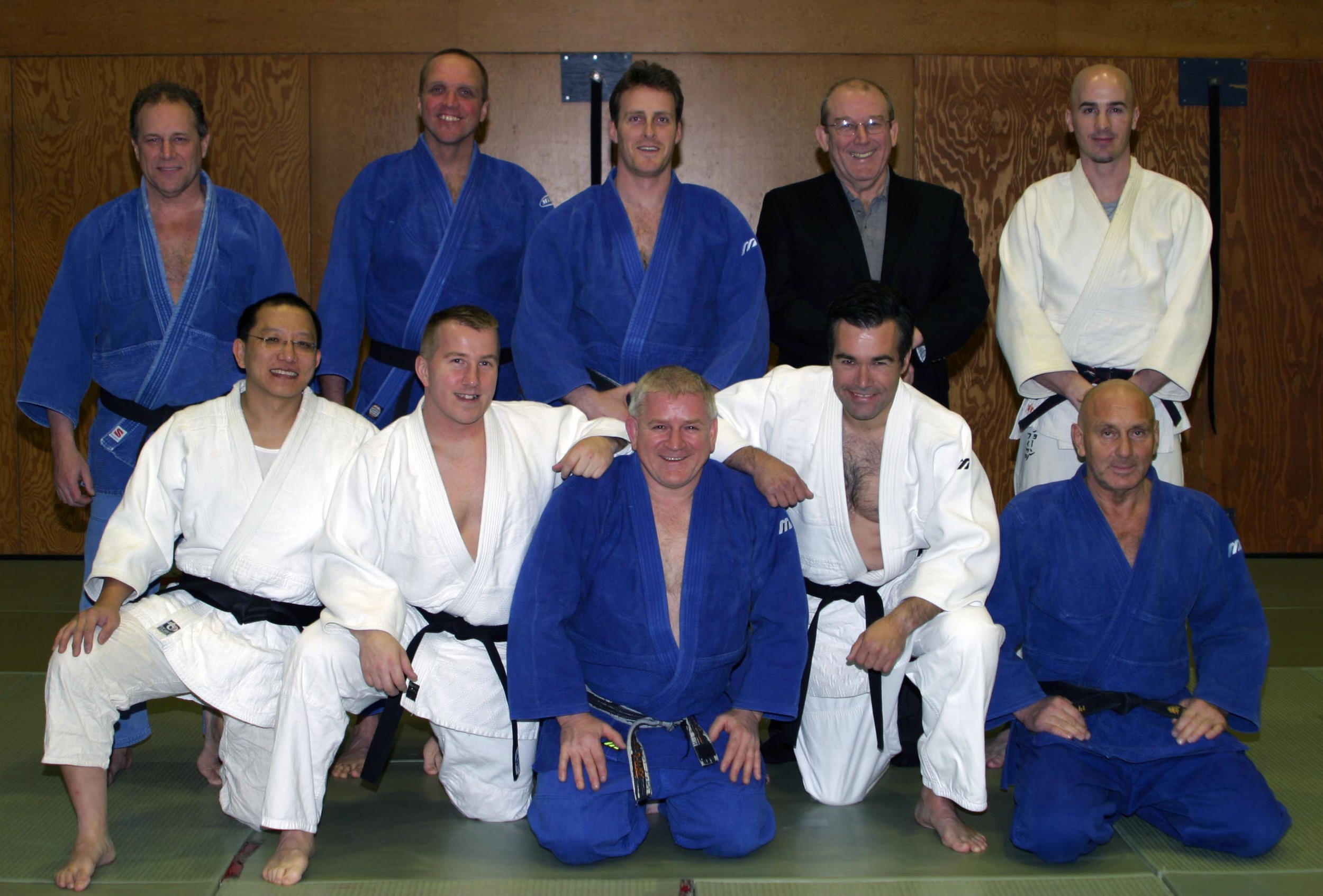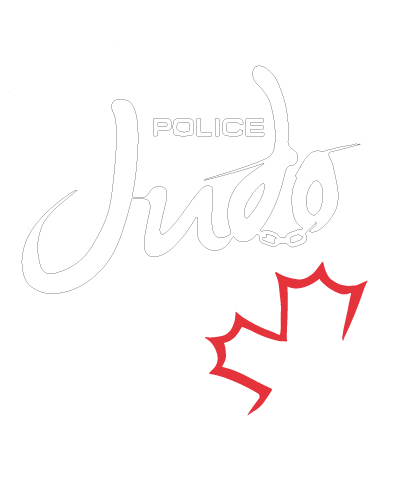Police Judo operates a number of recreational judo programs under the not for profit Law Enforcement Training Association - LETA. It is a judo-based physical training system designed to develop control and arrest skills, judo proficiency, physical literacy, strength, conditioning and self defence awareness. Police Judo is committed to teaching ethical use of force using appropriate, effective, and practical techniques for law enforcement.
A Short Overview of Police Judo
Police Judo was originally started at the Vancouver Police Department (VPD) by Ret. Insp. Tim Laidler over twenty years ago. It was developed into a unique form of recreational judo based on low-risk, high-yield judo throws well suited for law enforcement purposes by Ret. Cst. Al Arsenault, Sgt. Toby Hinton, and VPD Police Judo Civilian Head Instructor, Brian Shipper. This unique, non-competitive judo program applies the standing and ground elements of traditional (but non-sport) judo while incorporating control tactics best suited to street-level policing and self defence. The difference between sport and street is immense.
The Law Enforcement Judo Association (dba "Police Judo") is a registered non-profit society with the Provincial Government of BC. Police Judo is governed by a Board of Directors comprised of Ret. Insp. Tim Laidler (President), Dr. Kim Polowek (Director), and Cheryl Steinkampf (Treasurer).
Police Judo is a recreational judo-based training program designed to help bridge the gap between sport and street. Police Judo combines the most suitable high-yield, low-risk judo techniques with control and force options tactics for the best physical training for law enforcement, functional fitness, as well as self-defence. Police Judo is designed to be assist students and applicants with their physical preparation for a career in law enforcement. It is also an ongoing training program that can help keep officers tactically sharp for the job, whether it is security, corrections, policing or other law enforcement professions. For those with no interest in law enforcement, Police Judo offers a fun and challenging martial arts training program with the underlying philosophy to "take care of your partner". There are four Police Judo Clubs operating under the Law Enforcement Judo Association in BC.
Police Judo has been developed by law enforcement professionals who have decades of experience in use of force situations from the operational policing on the street, to work in correctional facilities. This is not a dojo-created training program developed by martial artists who have never put handcuffs on anyone, let alone testified on the application of their use of force. If you are training for law enforcement, make sure you know who you are training with and what their experience in policing and law enforcement is - outside of the dojo.
Police Judo is designed for sworn officers as well as students, volunteers, applicants and recruits. Because it is a recreationally-based judo training program (as opposed to a competitive sports model), the risk of injury has been greatly reduced. However, this is a physically challenging judo training program designed to help students develop functional strength related to controlling resistive, combative, and aggressive individuals. This program is suitable for individuals looking to get physically fit (have a good time doing it!) and learn valuable self-defence skills along the way. For those interested in law enforcement, proper training should begin at the front-end of a career, be relevant to the job demands, and be appropriate training under the National Use of Force model. Police Judo has been adapted and designed for real-life application by officers who have decades of experience working on the street. These are tested and proven techniques that work in difficult and challenging conditions.
One indicator of how healthy a martial arts club is can be found in how many females are on the floor participating. If the ratio is extremely low, the model may be flawed, and participants may not be doing a good job of "taking care of their partner". All three Police Judo Clubs have approximately 30% attendance by female students. This is a good start, considering that Police Judo is a tough, combat martial art, and one that matches individuals with a wide range of strength and abilities working out together in close quarters on the mat. We believe that it is a positive reflection on how Police Judo adheres to the philosophical underpinnings established by Jigoro Kano when he first developed judo. Although Police Judo has a much higher participation rate by females than conventional judo programs, we are constantly working on expanding the participation levels.

The use-of-force model for law enforcement officers in Canada is the National Use of Force Framework. Police Judo believes that students should learn and understand the National Use of Force framework early in their Police Judo training. While sport rules govern traditional judo, students in police judo are encouraged to familiarize themselves with the national standards that guide law enforcement on the use of force. In doing so they are connecting their training with the real world and gaining an understanding that the lawful application of force is a constantly evolving, situation-driven process.
All law enforcement personnel are under constant scrutiny regarding use-of-force, from the I-phone paparazzi through to the dept., criminal, and civilian oversight. Police Judo provides a low-key, effective means of taking people into custody. In order to handcuff someone, an officer needs to control them first. Police Judo provides the skills and confidence that will assist in the effective and ethical use of force when it is required. The highest risk time for assaults against police officers is during the point of first contact, often during the process of trying to bring an individual into custody. Police Judo helps bridge this gap by developing strategies and techniques that work, that are proactive, and ultimately help keep the officer safe during this process.
Police Judo is not a “quick-fix” weekend seminar solution to use-of-force inadequacies, although the training can begin there. In addition to supplemental training for in-service officers, this program often attracts people interested in careers in law enforcement, making it an ideal place to assess and groom future candidates. Long-term training yields enhanced fitness levels, arrest-and-control technique development, and confidence building. This can result in reductions in public complaints. Police Judo evolved from the extensive policing and martial arts experience of beat officers working in Vancouver, British Columbia. if you are looking for a moral, ethical, practical and effective way of taking uncooperative and violent people into custody, then these street- proven techniques developed by police, for police, may be of interest to you. This training program can easily co-exist as a supplement to departmental force options training units.
How Is the training done?
Although Police Judo incorporates techniques from a wide variety of martial arts including Karate, Jiu Jitsu, Aikido and Chin Na, the primary martial art that we rely on for training and skill development is judo. We expect our students to be good ambassadors of judo.
Police Judo stresses that how you train is how you will react on the street. The principles of simplicity and commonality of technique are important considerations. If an individual is interested in learning how to flip tires, flip tires. If an individual wants to learn how to flip, takedown, grapple and control a human body, do Police Judo.
Most police departments have a few classical judo trained officers or experienced martial artists with the requisite aptitude to start up their own Police Judo club - and we encourage this. Anyone can train in a safe and supportive environment where mutual respect is nurtured in the gym and practiced in the street. By training in a recreational fashion at one’s own pace and level, anyone can reap the benefits of Police Judo training.
Recreation vs. Competition?
The evolution of Police Judo has been one of constant evaluation, refinement, and development. The question we constantly need to ask is "what is our purpose?". The purpose of our program is to provide ongoing training for law enforcement personnel, and to better prepare the next generation of law enforcement officers. The training can serve to provide a robust fitness and self defence training for others who may not be interested in law enforcement but who may be interested in learning this practical martial art and getting in shape in the process. By defining our purpose, we are also making a statement about what is not important to our organization, and that includes a competition-based training program reliant on the collection of tournament points.
While many have dedicated hundreds of hours to post-secondary academic preparation for their career, not many students are as prepared as they could be for proper physical training for the career of law enforcement. This is primarily due to the fact that there are not the programs available at post secondary institutions which can function as a proper complement to the academic side for preparing for a career in law enforcement. These skills are equally important, but must be practiced regularly if they are going to be available in high-stress and dynamic situations.
We have deliberately created a recreational training program and eliminated the competitive aspects of the sport of judo, and we have done this after a careful assessment of our purpose. Police judo supports the concept of competitive judo and this stream produces some of the best conditioned athletes and the most brilliant displays of judo technique in the world. However, it is less suitable to those starting judo later in life (on average our students are starting after age 19 years old), and because of the beginner adult ratio, competitive-based judo carries a higher risk of injury, and this can become a career-altering injury for students in the application process for the field of law enforcement. If one wants to excel in competitive judo, this sport needs to be undertaken at an earlier age than university or college age. We believe that the practice of judo should be a life-long study, and the goal should be one of continual self-improvement.
If a judo club is based purely on a competitive model it can be less accessible for those who may be starting the training later in life, of limited interest for individuals who have no desire to compete, or too demanding for judoka players who want to continue simply doing judo recreationally beyond their competitive career. Anyone wishing to pursue a competitive career in judo or participate in traditional judo training is encouraged to contact Judo BC for a suitable traditional club in their geographic jurisdiction.
At Police Judo one of our goals is to help prepare many of our students for the rigours of physical testing for law enforcement and they need to be in top shape for this. Any injury incurred by a student could be a career side-lining injury depending on the severity along with where the individual is in the application or hiring process. If we look at what the students in our program want, they consistently rank fitness as their number one priority. This is our responsibility. If we apply the wrong model for our training program we could be inadvertently hampering a multi-million dollar contract (a policing career with a pension translates into a multi-million dollar return) and a job and career aspiration unlike no other, and one that many students have made significant sacrifices for.
As we have found out over the past two decades, the recreational model we have built for police judo is the right model: it allows the students to start training in the best suited martial art program for law enforcement, get strong physically, learn appropriate self-defence and force options techniques, and build their judo skills without risk of injury or any need/pressure to enter the competitive judo stream. It also encourages the training as an ongoing lifestyle, and if we are going to build in proper and ethical responses for use-of-force encounters, the training needs to be ongoing. Students will then develop the skills to use force judiciously, helping to develop the ability to not over-react or under-react to a situation, regardless of whether it be a combative and fighting individual, a drug-induced psychosis, or any other situation that requires one to step in, lay hands on, and safely take a person into custody.
Traditional vs. Non-Traditional
This subject might be a little touchy for some judo traditionalists, but we have found that there are some traditions worth maintaining and others that we can dispatch with. Most adults are enrolled in martial arts to get fit, learn self defence, and improve their life. In Police Judo, we also have a large number of students interested in learning this martial art to assist them with their career endeavours and the demands of a career in law enforcement.
Some of the traditions worth maintaining relate to the very foundation of judo, both on the philisophical side as well as the physical side. For example, "taking care of one's partner" along with "mutual benefit and welfare" are traditions that are critical to the development and growth of judo and ones that make judo the best-suited martial art for law enforcement. Encouraging individuals to become community-minded citizens involved in volunteer work, and positive role models for youth is another aspect of our philosophy at Police Judo. Learning how to use force, not only in self-defence, but ethically and properly in the line of duty is part of the uniqueness of this training program.
Proper judo movement, drills, break falls, throws, and groundwork and becoming stronger are physical training traditions that need to be maintained. Once basic judo skills like break falls are developed more refined training techniques appropriate for law enforcement can be brought in. Without a proper foundation for fitness and good physical literacy, the more complicated aspects of takedowns, armlocks under resistance, and ground control cannot be properly taught or learned. Training on drills that make regular practice out of safe and tactical manoeuvres is what will help students through real-life encounters when their stress is high and their fine motor skills are limited. Their brain will rely on trained patterns practiced repeatedly. Removing the sport aspect (as there are no referees in the real world) and focusing on the low-risk, high yield judo techniques that lend themselves well to law enforcement has allowed us to further refine the training by integrating force options training and techniques with traditional judo. Traditions that don't support or assist in our training are not retained and we will not spend a lot of time on throws that have little utility on the street such as sacrifice throws (Tomoe nage etc).
For law enforcement purposes, teaching a class in Japanese language (while nice to learn) is one tradition that we don't need to adopt. We are preparing students for a field where they may use their training and have to articulate and explain any use of force, so they better know how to do it in the language they will be writing their reports in, explaining the situation verbally, and possibly testifying in court with. From foot sweeps to leg reaps, all the low-risk, high-yield throws in judo (for our purposes) should be explained and understood in English first. For higher belts and ongoing learning, the Japanese terminology is learned later, or along the way, as it is a universal judo language.
Every minute for training counts. There are no formal bow-ins: our warm-ups start with joint rotation and then movement drills to get the body warm and ready for practice. Our work-outs conclude with a warm-down and yoga stretching. At Police Judo respect from our students is earned and not demanded by rank or title. Once one has attained the level of Black Belt Instructor in Police Judo, there are two additional gradings: Assistant Instructor Black Belt Police Judo and Instructor Police Judo. As Police Judo grows and develops, we will aim to further develop the standards and training syllabus and keep the bureaucratic rules, regulations, and politics to a minimum. We have had enough of the "regulation and procedure manual" in our normal jobs and are trying to bring the fun back into judo training - there are enough politics and stressors with the rest of life - judo training should provide sanctuary and a physical and mental break for students. Training in Police Judo needs to be relevant and fun. And no one needs another bureaucracy to answer to.
We respect the long history and tradition behind the martial art of judo. However, we have to be pragmatic about our training time with students and we owe it to them to challenge a few paradigms, retain what fits and works well from the traditional martial art of judo, and drop or modify what does not fit. This is a work in progress, and we will be continuing to apply critical thinking to all of our training and continually work to make our students fit, strong, skilled at police judo, and best equipped to deal with the world that awaits them. We think that Jigoro Kano - if he was around - would appreciate this approach to the physical and mental development of our students through the martial art he developed. Along the way for this journey we hope to promote and encourage the growth of Judo as a base martial art for Law Enforcement training.
Belt Ranking and Grading
Police Judo adheres to the same belt ranking system as traditional judo starting at white belt, and moving through yellow belt, orange, green, blue, brown and then finally black belt.
Police Judo will recognize the belts attained by students in traditional judo, so they are welcome to wear their coloured belt on the mat up to and including black belt in judo.
However, if students want to obtain a black belt in Police Judo, they will have to register with Police Judo for this and register with the Head Instructor of their respective club.
For students practicing at traditional judo clubs please adhere to the requirements of the club regarding grading and belt acceptance. There are many aspects of Police Judo training and techniques that are not covered in traditional judo practices, and a significant amount of techniques and training that we are not dedicating limited and valuable training time for as they have little utility for the real world application of judo.
Mission Statement:
Police Judo is a recreational judo training program designed for participants of all ages and skill levels. Police Judo combines low-risk, high-yield judo techniques with other martial arts training in order to develop strength, fitness, conditioning, self defense, and force options arrest and control skills for law enforcement. The underlying philosophy of Police Judo is based on the traditional judo principle to “take care of one’s partner” and promotes “mutual benefit and respect” for every student.
Core Values:
Recreational - training that can be maintained for life
Appropriate - functional techniques and drills for the field of Law Enforcement
Safe - demanding physical training without injury
Fitness - challenging functional physical workouts and training
Fun – enjoyable for all participants
Black Belt Grading Requirements
Police Judo follows a grading system that runs from white belt (beginner starting judo) through to black belt (experienced). The adopted graduated belt system has a similar progression as traditional judo, from white/yellow/orange/green/blue/brown/black. Police Judo recognizes the traditional grading certification for colored belts, but has specific requirements unique to police judo in order to certify a member as a Police Judo black belt.
Below are the minimum requirements:
A recognized Brown Belt in Police Judo/Judo with a minimum of two years of Police Judo training, with a commitment to have trained at least 160 hours (80 practice sessions) in a certified Police Judo Club. This time commitment should be verified through club sign-ins.
A member of the Law Enforcement Judo Association, in good standing.
Demonstrated competency in Police-specific judo techniques including low-risk high-yield judo throws, breakfalls, force-options escort-hold curriculum, twist lock proficiency, partner drills, arm extraction techniques, multiple assailant drills for both standing and ground work, standing arm lock techniques, roll-overs, arm escorts, partner take-downs and ground work control, standing and prone handcuffing techniques.
NCCP 1 / 2 general multi-sport coaching qualification.
Basic First Responder First Aid Training (CPR).
A comprehensive understanding of the National Use of Force Framework and an ability to reference and incorporate this in a Police Judo training context.
Completion of the Increment Judo Course on the history of Police Judo, philosophy of judo and Police Judo, with a pass on the written examination for this course.
Completion of related Police Judo Clinics including the Police Judo Higher Belt Clinic, Handcuffing and Takedown Clinic, the annual VPD International Police Judo Clinic or other Police Judo sponsored clinics.
An ability to demonstrate the arrest and control tactics of Police Judo.
Instruction related to sport injury/concussions and an understanding of coaching liability.
Demonstrated history of volunteer assistance in coaching the police judo programs and/or the police judo youth programs and with other community initiatives especially those involved with caring for other people.
Ability to instruct and structure warm-up drills, partner drills, police judo techniques, ground work drills, tactical get-ups, shadow practice and form practice partner drills, and circuit training warm-ups.
Proven competence at developing practice curriculum for individual police judo practices with achievable practice goals.
Criminal Record Security Clearance as approved by Police Judo and maintained in good standing.
The approval of the Police Judo Grading Board for certification as a Police Judo black belt.
An agreement that the black belt member will only open a Police Judo club with the approval and consent of the Law Enforcement Judo Association Principal Instructors.
The Police Judo Instructor Grading Board reserves the right to promote exceptional individuals who may not possess all of the a/m criteria based on extraordinary qualifications such as individuals with an extensive martial arts resume, a long history in police training, and a background involved in assisting and developing police judo.
Reviewed July 2021 TH
Assistant Instructor Police Judo Black Belt / Instructor Police Judo Black Belt:
There are specific requirements for Assistant Instructor and Instructor Certification related to Police Judo.
Come to work with a few of the Police Judo Instructors!
The Beat Reality Series
Starring: Constable Kristie Fisher, Sergeant Toby Hinton, Constable Tim Russell
Directors: Eli Gorn
Producers: Arnie Gelbart, Jesse Fawcett, Michael Kronish, Stacey Tenebaum
Supporting actors: Constable Shane Aitken, Sergeant Mark Steinkampf, Inspector John McKay, Kathleen Fee
